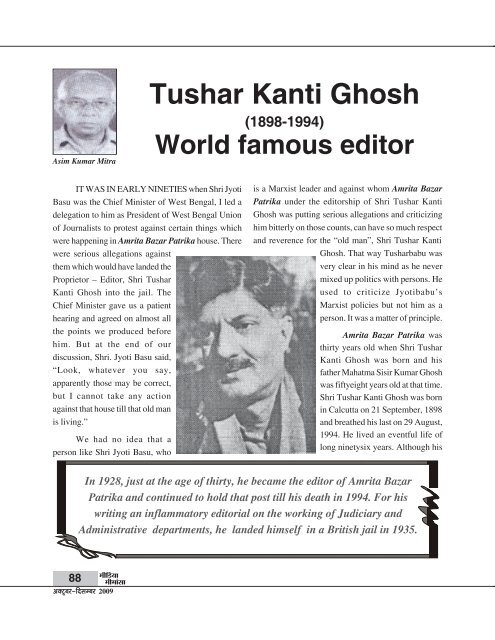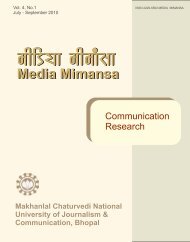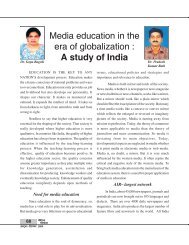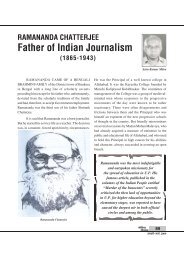You also want an ePaper? Increase the reach of your titles
YUMPU automatically turns print PDFs into web optimized ePapers that Google loves.
Asim Kumar Mitra<br />
<strong>Tushar</strong> <strong>Kanti</strong> <strong>Ghosh</strong><br />
(1898-1994)<br />
World famous editor<br />
IT WAS IN EARLY NINETIES when Shri Jyoti<br />
Basu was the Chief Minister of West Bengal, I led a<br />
delegation to him as President of West Bengal Union<br />
of Journalists to protest against certain things which<br />
were happening in Amrita Bazar Patrika house. There<br />
were serious allegations against<br />
them which would have landed the<br />
Proprietor – Editor, Shri <strong>Tushar</strong><br />
<strong>Kanti</strong> <strong>Ghosh</strong> into the jail. The<br />
Chief Minister gave us a patient<br />
hearing and agreed on almost all<br />
the points we produced before<br />
him. But at the end of our<br />
discussion, Shri. Jyoti Basu said,<br />
“Look, whatever you say,<br />
apparently those may be correct,<br />
but I cannot take any action<br />
against that house till that old man<br />
is living.”<br />
We had no idea that a<br />
person like Shri Jyoti Basu, who<br />
is a Marxist leader and against whom Amrita Bazar<br />
Patrika under the editorship of Shri <strong>Tushar</strong> <strong>Kanti</strong><br />
<strong>Ghosh</strong> was putting serious allegations and criticizing<br />
him bitterly on those counts, can have so much respect<br />
and reverence for the “old man”, Shri <strong>Tushar</strong> <strong>Kanti</strong><br />
<strong>Ghosh</strong>. That way <strong>Tushar</strong>babu was<br />
very clear in his mind as he never<br />
mixed up politics with persons. He<br />
used to criticize Jyotibabu’s<br />
Marxist policies but not him as a<br />
person. It was a matter of principle.<br />
Amrita Bazar Patrika was<br />
thirty years old when Shri <strong>Tushar</strong><br />
<strong>Kanti</strong> <strong>Ghosh</strong> was born and his<br />
father Mahatma Sisir Kumar <strong>Ghosh</strong><br />
was fiftyeight years old at that time.<br />
Shri <strong>Tushar</strong> <strong>Kanti</strong> <strong>Ghosh</strong> was born<br />
in Calcutta on 21 September, 1898<br />
and breathed his last on 29 August,<br />
1994. He lived an eventful life of<br />
long ninetysix years. Although his<br />
In 1928, just at the age of thirty, he became the editor of Amrita Bazar<br />
Patrika and continued to hold that post till his death in 1994. For his<br />
writing an inflammatory editorial on the working of Judiciary and<br />
Administrative departments, he landed himself in a British jail in 1935.<br />
®…“ b˜……<br />
®…“®……∆∫……<br />
88<br />
+C]⁄ı§…Æ˙- n˘∫…®§…Æ˙ 2009
<strong>Tushar</strong>babu was very clear in his mind as he never mixed up politics<br />
with persons. He used to criticize Jyotibabu’s Marxist policies but not<br />
him as a person. It was a matter of principle.<br />
father had started Amrita Bazar Patrika and his father<br />
and his uncles Shri Motilal <strong>Ghosh</strong> and Shri Golaplal<br />
<strong>Ghosh</strong>, by their relentless fight against the foreign rule,<br />
had acquired a prestigious place in the society, it was<br />
<strong>Tushar</strong>babu who expanded the area of its influence<br />
and covered many more areas by new publications. In<br />
1928, just at the age of thirty, he became the editor of<br />
Amrita Bazar Patrika and continued to hold that post<br />
till his death in 1994. For his writing an inflammatory<br />
editorial on the working of Judiciary and<br />
Administrative departments, he landed himself in a<br />
British jail in 1935.<br />
His family belonged to the Mogra Amrita Bazar<br />
village of the Jessore district (now in Bangladesh).His<br />
father, Shri Sisir Kumar <strong>Ghosh</strong> was deeply engaged<br />
in the publication of the Amrita Bazar Patrika<br />
alongwith his brothers S/shri Motilal <strong>Ghosh</strong> and<br />
Golaplal <strong>Ghosh</strong>. The Amrita Bazar Patrika had already<br />
been founded by the <strong>Ghosh</strong> brothers in 1868 as a<br />
Bengali weekly published from their native village,<br />
Amrita Bazar and printed at their own printing press.<br />
Apprehending ill motives and stringent action under<br />
Vernacular Press Act by the then British Government,<br />
the newspaper was converted into a full fledged English<br />
weekly with effect from 21 March 1878 —the second<br />
week of operation of the Act. It was Shri Sisir Kumar’s<br />
genius and dedication to the cause of a free press<br />
that saved the newspaper from the clutches of a<br />
mischievous law enforced by an alien government.<br />
The Patrika became a daily on 19 February, 1891.<br />
Youngest of the eight children<br />
With her eight children and as a member of a<br />
big joint family, his mother could not look after her<br />
youngest child, <strong>Tushar</strong> <strong>Kanti</strong> very much. The child<br />
grew up along with children, had his schooling at the<br />
Town School and Hindu School in Calcutta and<br />
matriculated at the age of sixteen. He joined his B. A.<br />
course and passed out in 1920 from Vidyasagar<br />
College, Calcutta. Those were the days of turbulence<br />
when the Patrika was going through its glorious as<br />
well as critical periods. Its security deposit with the<br />
government was forfeited in 1919 for the two editorials<br />
(i) To whom does India belong (18 April) and (ii)<br />
Arrest of Mr. Gandhi: More outrages (12 April). On<br />
May 15 of the same year, the government of Sir<br />
Michael O’Dwyer banned the entry of the Patrika into<br />
the province of Punjab.<br />
<strong>Tushar</strong> <strong>Kanti</strong> grew up during those exciting<br />
times. When his father, Shri Sisir Kumar died in 1911,<br />
®…“ b˜……<br />
®…“®……∆∫……<br />
89<br />
+C]⁄ı§…Æ˙- n˘∫…®§…Æ˙ 2009
his uncle Shri Motilal <strong>Ghosh</strong> took over the editorial<br />
responsibility. As was the practice in the Patrika<br />
groups those days, <strong>Tushar</strong> <strong>Kanti</strong> joined the<br />
organization as a clerk in the Advertisement<br />
department. Thereafter, he started serving his<br />
apprenticeship in many of the departments of the<br />
paper and gathered all-round experience of newspaper<br />
journalism from composing, proof-reading onwards.<br />
When Shri Motilal <strong>Ghosh</strong> died in 1922, his other<br />
uncle, Shri Golaplal <strong>Ghosh</strong> became the Editor of the<br />
paper. After some time and at the behest of Shri<br />
The <strong>Ghosh</strong>es were a family with a progressive outlook.<br />
In fact, Sisir Kumar and his brothers had embraced<br />
Brahmoism at an early stage. Later, they became<br />
Vaishnavas and <strong>Tushar</strong> <strong>Kanti</strong> and his family turned<br />
into ardent followers of Shri Chaitanya. <strong>Tushar</strong> <strong>Kanti</strong>’s<br />
interest spanned a variety of subjects like history,<br />
philosophy and literature.’<br />
Married in the year 1920 to Shrimati Bibha Rani,<br />
daughter of Shri A. K. Dutta of Midnapore, <strong>Tushar</strong><br />
<strong>Kanti</strong> had two children. His son, Tarun <strong>Kanti</strong> <strong>Ghosh</strong><br />
was a Minister of the West Bengal Government for<br />
Shri <strong>Tushar</strong> <strong>Kanti</strong>’s stewardship of the paper covers well<br />
over half-a-century of eventful years during which he<br />
steered the paper high to make it one of the leading<br />
newspapers of the country.<br />
Golaplal, who was in indifferent health, Shri <strong>Tushar</strong><br />
<strong>Kanti</strong> took over the editorial responsibility in 1928 till<br />
his death in 1994. Shri <strong>Tushar</strong> <strong>Kanti</strong>’s stewardship of<br />
the paper covers well over half-a-century of eventful<br />
years during which he steered the paper high to make<br />
it one of the leading newspapers of the country.<br />
While writing about Shri <strong>Tushar</strong> <strong>Kanti</strong> <strong>Ghosh</strong>,<br />
Shri P. K. Roy, who served the Patrika house as a<br />
managerial head for a long time, mentioned that ‘the<br />
<strong>Ghosh</strong> family loved music as a matter of tradition.<br />
<strong>Tushar</strong> <strong>Kanti</strong>’s father as well as uncles were singers<br />
and musicians in their own way. <strong>Tushar</strong> <strong>Kanti</strong> himself<br />
inherited the musical talent and loved classical music<br />
about twentyone years. His daughter, Srilekha was<br />
married to a chemist entrepreneur. She lives in<br />
Mumbai.<br />
For the first time in 1935, the Patrika<br />
organization was in an expanding mood. One of the<br />
first thing <strong>Tushar</strong> <strong>Kanti</strong> did was to launch a Bengali<br />
daily, Jugantar with Shri Jatin Bhattacharya as<br />
Editor. There is an interesting story about how<br />
<strong>Tushar</strong> <strong>Kanti</strong> acquired the name Jugantar for his<br />
Bengali daily newspaper as there was already a<br />
newspaper named Jugantar run by the<br />
revolutionaries of Bengal. In fact, this newspaper<br />
was the mouthpiece of the revolutionary<br />
®…“ b˜……<br />
®…“®……∆∫……<br />
90<br />
+C]⁄ı§…Æ˙- n˘∫…®§…Æ˙ 2009
organization. By the time<br />
<strong>Tushar</strong> <strong>Kanti</strong> intended to<br />
publish a Bengali daily, almost<br />
all the revolutionaries<br />
including the Editor of<br />
Jugantar, Upendra Nath<br />
Bandyopadhyay were arrested<br />
and Sivaram Chakravorty, a<br />
humorist writer of the time was<br />
entrusted with the job of<br />
running the newspaper<br />
including its editing. But<br />
Sivaram found it very difficult<br />
to publish the newspaper.<br />
<strong>Tushar</strong> <strong>Kanti</strong> came to know the<br />
situation and took advantage.<br />
He offered Rs. 500 to buy the<br />
title of the newspaper which<br />
Sivaram readily accepted and sold the title to<br />
<strong>Tushar</strong> <strong>Kanti</strong>. Some years later however, he<br />
himself took over the editorship of Jugantar.<br />
He reached another milestone in newspaper<br />
publication by starting an edition of Amrita Bazar<br />
Patrika from Allahabad in 1943 and also a Hindi<br />
daily Amrita Patrika from the same centre in 1950.<br />
He was the Chief Editor of Northern India Patrika<br />
and Hindi, Amrit Prabhat brought out from<br />
Allahabad and Lucknow simultaneously. He also<br />
brought out a Bengali weekly magazine Amrita<br />
from Calcutta.<br />
Internationally known editor<br />
<strong>Tushar</strong> <strong>Kanti</strong> held an eminent position in the<br />
professional world both in India and abroad and was<br />
an internationally known Editor. He was an Executive<br />
Council member of the London - based<br />
Commonwealth Press Union and had been the<br />
Chairman of the Indian Section since 1959. He was<br />
President of Indian and Eastern<br />
Newspaper Society (1948),<br />
Chairman of Audit Bureau of<br />
Circulation (1964), President of<br />
the All India Newspaper Editors’<br />
Conference for two terms (1946<br />
and 1948), and also Chairman of<br />
Press Trust of India (1956) of<br />
which he was a Founder-Director.<br />
The President of India conferred<br />
on him the title PADMA<br />
BHUSHAN in recognition of his<br />
valuable service to journalism.<br />
<strong>Tushar</strong> <strong>Kanti</strong> was a widely<br />
travelled man. He had travelled<br />
almost every part of the world. He<br />
took his first trip to Europe soon after the World War<br />
II was over.<br />
<strong>Tushar</strong> <strong>Kanti</strong> was a person with humorous<br />
mind. Apart from writing in English, he shared his<br />
humor through writings in Bengali. In this<br />
connection, the names of three Bengali books<br />
written by him should be mentioned here (i)<br />
BICHITRA KAHINI, (ii) AARO BICHITRA<br />
KAHINI, (iii) CHITRA-BICHITRA etc. They are<br />
all light-hearted anecdotal books reflecting his<br />
strong sense of humor.<br />
Having been brought up in liberal traditions and<br />
to satisfy his own wide reading interest, he built up a<br />
collection of rare books printed in India and abroad.<br />
<strong>Tushar</strong> <strong>Kanti</strong> was a man of simple habits and was a<br />
teetotaller. He was a deeply religious man and an<br />
excellent raconteur and highly amiable in his<br />
disposition.<br />
The writer is an eminent journalist.<br />
(e mail ID : mitraasimkumar@rediffmail.com)<br />
®…“ b˜……<br />
®…“®……∆∫……<br />
91<br />
+C]⁄ı§…Æ˙- n˘∫…®§…Æ˙ 2009






